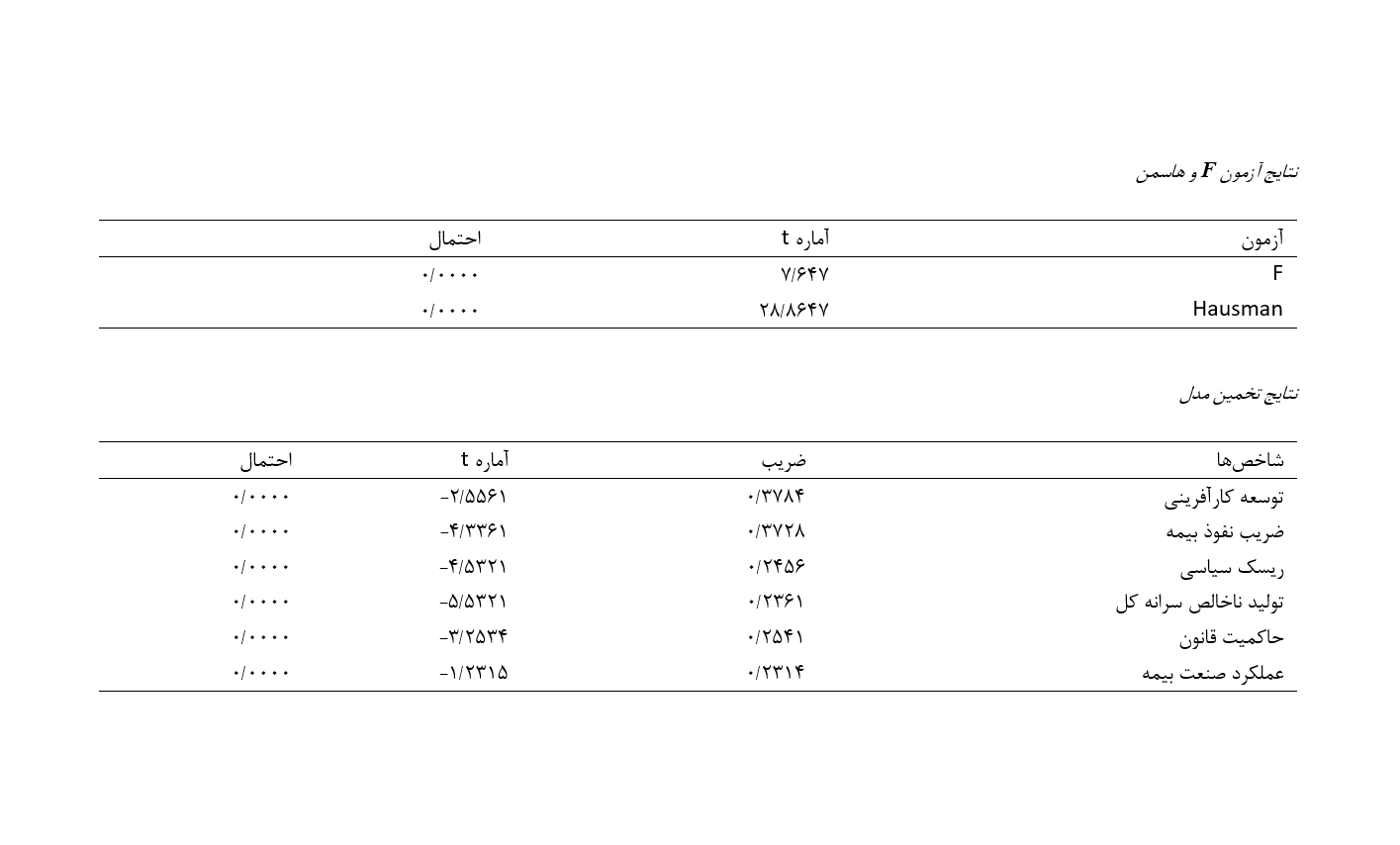ارائه مدلی جهت تعیین شاخصهای کلیدی عملکرد صنعت بیمه بر توسعه اکوسیستم کارآفرینی با استفاده از رهیافت دادههای تابلویی در کشورهای منتخب در بازه زمانی(2020-2010)
کلمات کلیدی:
شاخص¬های کلیدی عملکرد صنعت بیمه, توسعه اکوسیستم کارآفرینی, کشورهای منتخب, داده¬های تابلوییچکیده
هدف از مقاله حاضر ارائه مدلی جهت تعیین شاخصهای کلیدی عملکرد صنعت بیمه بر توسعه اکوسیستم کارآفرینی با استفاده از رهیافت دادههای تابلویی در کشورهای منتخب در بازه زمانی(2020-2010)است. جامعه آماری پژوهش حاضر کشورهای منتخب (فیلیپین، ایران، قزاقستان، آفریقای جنوبی، مجارستان، سوئد، لهستان، پرو، مکزیک، آرژانتین، برزیل، کلمبیا، مالزی، استرالیا، تایلند، کرواسی، ایالات متحده آمریکا، انگلستان و نروژ) با استفاده از روش داده های تابلویی انجام شد. برای این منظور از دادههای مربوط به کشورهای منتخب طی دوره زمانی 2010-2020 و رهیافت دادههای تابلویی استفاده شد. جهت تجزیه و تحلیل دادهها از نرم افزار Eviews نسخه 21 استفاده شد. نتایج تحلیل نشان داد که همبستگی معناداری بین عملکرد صنعت بیمه با متغیرهای توسعه کارآفرینی، ضریب نفوذ بیمه، ریسک سیاسی، تولید ناخالص سرانه کل، حاکمیت قانون وجود دارد. برای سنجش پایایی شاخصها از آزمون لوین لین و چو استفاده شد. نتایج نشان داد که تمامی شاخصهای مورد بررسی پایا هستند. نتایج آزمون هم انباشتگی نشان داد که یک رابطه قوی بلندمدت بین متغیرهای مورد استفاده وجود دارد. ضریب برآورد شده تخمین مدل برای متغیرها؛ توسعه کارآفرینی ، ضریب نفوذ بیمه، ریسک سیاسی ، تولید ناخالص سرانه کل، حاکمیت قانون ، عملکرد صنعت بیمه برابر 3784/0-،3728/0-،2456/0-،2361/0-،2541/0-،2314/0 میباشد. به طور نمونه ضریب برآورد شده برای تولید ناخالص سرانه کل(GDP) سرانه برابر 2361/0- است. این امر بیانگر این است که 1 درصد افزایش (کاهش) در تولید تولید ناخالص سرانه کل، شاخص عملکرد صنعت بیمه به اندازه 2361/0 درصد کاهش (افزایش) مییابد.
دانلودها
مراجع
Ahmadi, S., Akhavan Mahdavi, M., & Mokhtari, M. (2018). Identifying Entrepreneurial Opportunities in Social Sciences
and Sociological Explanation of Factors Affecting the Exploitation of Opportunities in Iran. Journal of Applied
Sociology, 29(3), 181-202. https://doi.org/10.22108/jas.2018.107627.1219
Buana, Y., Hidayat, D., & Prayogi, B. (2020). The Effect of Entrepreneurship Education on Entrepreneurial Intention of
University Students by Adopting Linan Model. Binus Business Review, 8(1), 67-75.
https://doi.org/10.21512/bbr.v8i1.1958
Karami, S., Malamirzaei, F., & Movahedi, R. (2016). The Impact of Entrepreneurship Education and Its Benefits on the
Entrepreneurial Intentions of Agricultural Students in Western Universities. Journal of Agricultural Education
Management Research, 8(38), 51-65. https://itvhe.areeo.ac.ir/article_107203.html
Koushki Jahromi, A. R., & Boodlaei, H. (2020). Examining the Relationship Between Organizational Knowledge
Management Factors and Organizational Entrepreneurship. First Annual Conference on Management, Innovation,
and Entrepreneurship, Shiraz.
Maarefvand, A., & Shafiabady, A. (2024). Effectiveness of Shafie-Abadi's Multidimensional Model Training on
Enhancing Occupational Well-being and Quality of Work Life among Teachers in Qom City. International Journal
of Education and Cognitive Sciences, 4(4), 21-30. https://doi.org/10.61838/kman.ijecs.4.4.3
Malekpour Lapari, K., & Delavar, A. (2016). The Role of University Education in Creating Entrepreneurial Spirit and
Strategies for Enhancing It. Educational Research Journal(3 and 4). https://erj.khu.ac.ir/article-1-115-fa.html
Miri Rami, S. F., Delgoshaei, Y., & Mahmoudi, A. H. (2022). Identification and Analysis of Effective Factors on the
Strategic Intelligence of Education Districts Managers of Tehran City and Provide an Appropriate Model [Research
Article]. Iranian Journal of Educational Sociology, 5(1), 113-125. https://doi.org/10.61186/ijes.5.1.113
Rezaei, F., & Faghih Abdollahi, A. (2019). The Impact of Entrepreneurship Education on Entrepreneurial Intentions and
Psychological Characteristics of Employees (Case Study: Entrepreneurship Centers of Physical Education Colleges
in the Country). Second International Conference on New Horizons in Basic Sciences and Engineering, Tehran.
Saeed, S., Yousafzai, S. Y., Yani-De-Soriano, M., & Muffatto, M. (2020). The role of perceived university support in
the formation of students' entrepreneurial intention. Journal of Small Business Management, 53(4), 1127-1145.
https://doi.org/10.1111/jsbm.12090
Santos, D., Zen, A., & Schmidt, V. (2017). Entrepreneurship Ecosystems and the Stimulus to the Creation of Innovative
Business: A Case in the App Industry in Brazil. Journal of Research in Business, Economics and Management, 8(5).
https://www.researchgate.net/publication/334261038_RESEARCH_ORGANISATION_Entrepreneurship_Ecosyst
ems_and_the_Stimulus_to_the_Creation_of_Innovative_Business_A_Case_in_the_App_Industry_in_Brazil
Vamvaka, V., Stoforos, C., Palaskas, T., & Botsaris, C. (2020). Attitude toward entrepreneurship, perceived behavioral
control, and entrepreneurial intention: dimensionality, structural relationships, and gender differences. Journal of
Innovation and Entrepreneurship, 9(1). https://doi.org/10.1186/s13731-020-0112-0
Zollo, L., Laudano, M. C., Ciappei, C., & Zampi, V. (2020). Factors affecting universities' ability to foster students'
entrepreneurial behaviour: An empirical investigation. Journal of Management Development.
ntrepreneurial_behaviour_An_empirical_investigation

دانلود
چاپ شده
ارسال
بازنگری
پذیرش
شماره
نوع مقاله
مجوز
حق نشر 2024 تکنولوژی در کارآفرینی و مدیریت استراتژیک

این پروژه تحت مجوز بین المللی Creative Commons Attribution-NonCommercial 4.0 می باشد.










